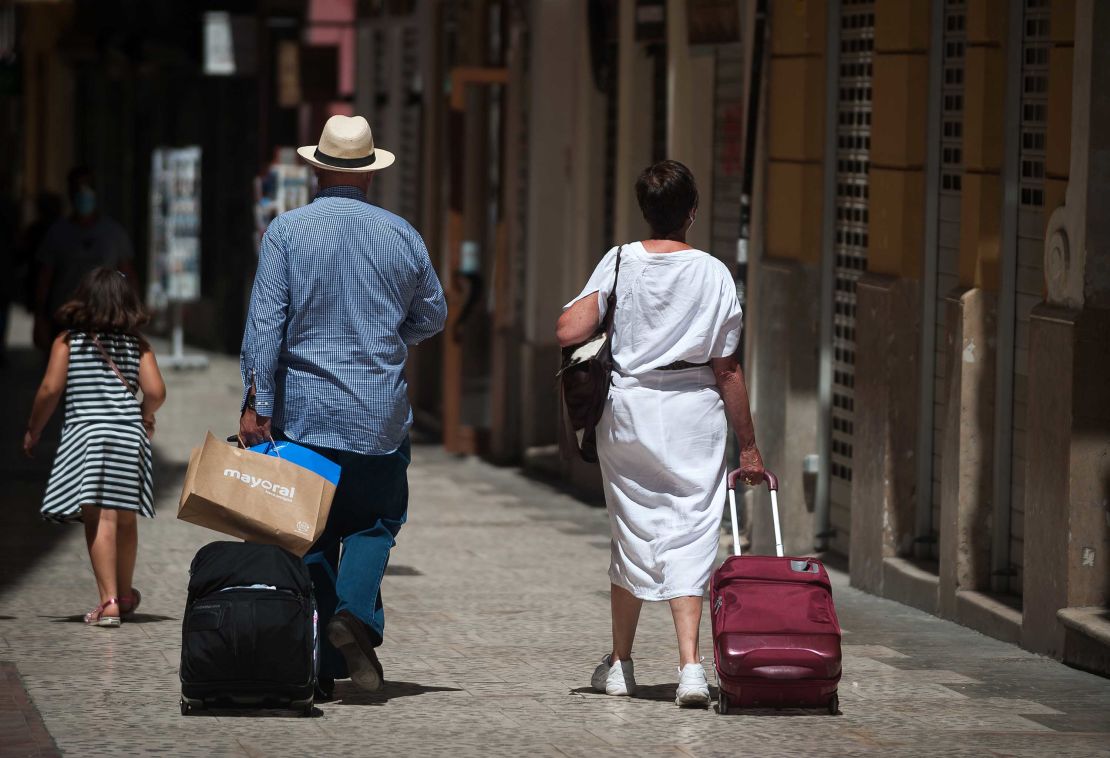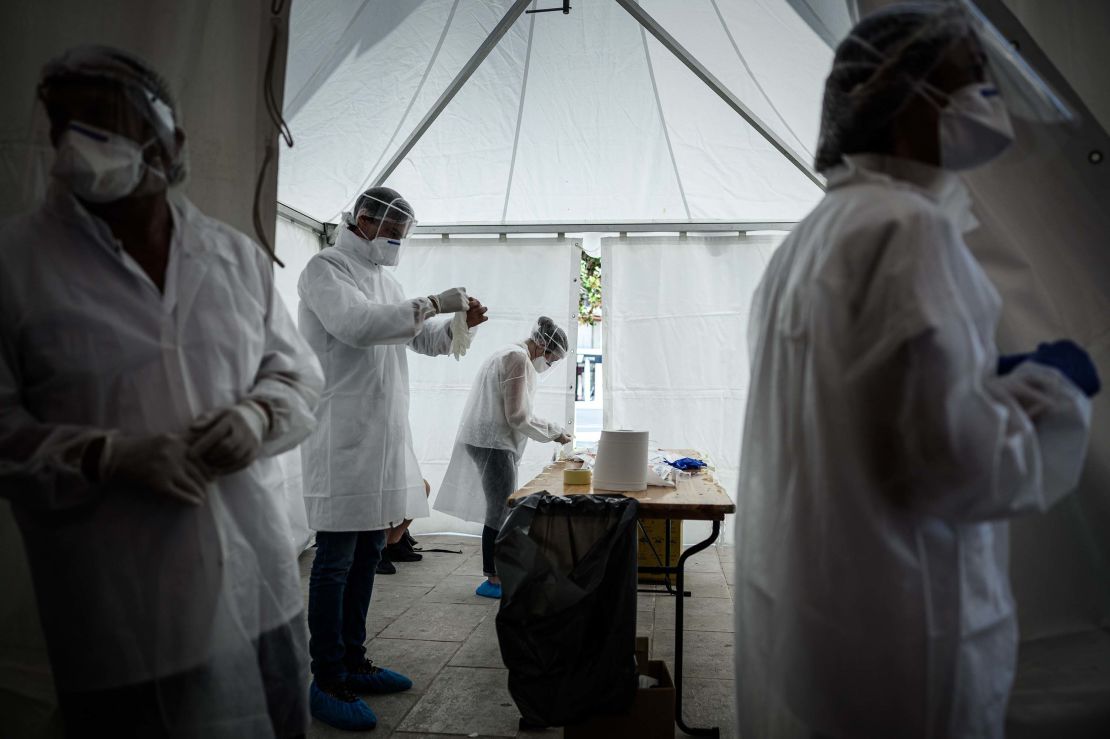The arrival of warm summer days and an end to multiple travel bans had lots of us hoping that our much-anticipated vacations could be back on the cards after months of lockdown.
Families and friends who have been stuck indoors as the coronavirus pandemic raged around the world began booking flights and hotels to snatch a brief moment of respite from the 24-hour cycle of bad news.
Now these plans have been thrown into doubt in the UK – among other countries – after the British government reintroduced 14-day mandatory quarantine rules for travelers returning from Spain, and warned that travel bridges to popular vacation destinations such as France and Germany could also close again.
“We have to keep the situation under review and I think that is what the public would expect us to do,” junior health minister Helen Whately told Sky News, when asked about reports that more countries could be removed from the UK’s safe list.

“If we see rates going up in a country where at the moment there is no need to quarantine … we would have to take action because we cannot take the risk of coronavirus being spread again across the UK,” Whately said.
She said people “should be aware that we are in a situation of global pandemic,” adding: “We put in place the travel bridges because people wanted to be able to travel but we did say at the time that we had to keep it under review and that’s exactly what we’ve done with Spain.”
Rapid rise in cases
The UK’s sudden decision to reinstate the two-week self-isolation requirement came after Spain reported 922 new Covid-19 cases on Friday, and 971 on Thursday – the country’s highest increases since May 8.
The British government reported 769 new cases on Thursday and 768 on Friday.
Spain announced that lockdown restrictions would be reimposed in the northern region of Aragon, while Barcelona and several other parts of Catalonia have also been put under stricter measures by the regional government.
Speaking on Sky News on Sunday, Britain’s Foreign Secretary, Dominic Raab, said the government “took the decision as swiftly as we could, and we can’t apologize for doing so.”
The UK has a higher number of total confirmed cases and deaths than Spain, with the third highest death toll (behind the US and Brazil) globally. But with cases rising much faster in Spain currently, British travelers returning from the country will not be able to leave their homes for two weeks.
Phil Bicknew, a British tourist returning from a weekend in Valencia with his partner, told CNN he was “half expecting” the new quarantine rules, but it was a “strange scenario.”
“We have two children and a dog. I don’t know if I can take the dog for a walk. I don’t know how it will work,” he said.
Bicknew’s children are staying with their grandparents and he said his son might stay there so he can still go out to play cricket. “Not sure how our daughter will react, she’s only nine. So we’ll probably end up splitting the family up for 14 days. We don’t live far apart, but it’s still a strange scenario we’ve never faced before,” he added.
Miriam Cortez, a London doctor visiting her parents for the first time since Christmas, told CNN she would have to miss 14 days of work on her return.
“I came two weeks ago when there was no quarantine rules and yesterday they imposed new quarantine. So I asked my job and they are not going to test us,” she said.
Cortez said she felt it was “a bit unfair” to include the whole of Spain in the quarantine rules. “The rules are more strict here than in London. I feel more safe here than there, really.”
British tourist Carolyne Lansell, who was flying to Ibiza from Madrid on Sunday, told Reuters she was “frustrated” by the new rules, especially because Spain felt safer than the UK, with everybody wearing masks.
Emily Harrison, from Essex in southeast England, told Reuters she disagreed with the move because “it’s just come all of a sudden, it’s not given very much time to prepare so everyone is now panicking, and I also think it ruins plans for everybody.”
‘Damaging for business’
The UK’s abrupt step is not only a blow for travelers, but could be damaging to the global tourism industry, with businesses from major airlines to small restaurants and guesthouses already struggling to survive the pandemic.
In response to the new rules, tour operator TUI told CNN in a statement on Sunday that it was canceling “all holidays to mainland Spain” between now and August 9.
TUI’s Managing Director Andrew Flintham said in a statement earlier on Sunday that the operator was “incredibly disappointed” at the British Government’s snap decision to close the travel corridor between Spain and the UK.
“This level of uncertainty and confusion is damaging for business and disappointing for those looking forward to a well-deserved break,” TUI’s statement said.
The news has raised fears over which so-called “air corridors” could close next, as local outbreaks of the virus continue to flare up around the world, even in nations that appeared to have effectively dealt with the pandemic.
Norway will also impose a mandatory 10-day quarantine for all travelers returning from Spain following the spike in coronavirus cases, its Ministry of Foreign Affairs announced on Saturday.
Norway advises against all non-essential travel for several countries within Europe, including Andorra, Bulgaria, Croatia, Luxembourg, Portugal, Romania, Spain and some regions of Sweden, the ministry said in a statement.

The regular, unpredictable emergence of new local lockdowns is set to wreck plans for both international and domestic vacations, with countries including Spain, Germany, the UK and Australia introducing targeted regional lockdowns.
French Prime Minister Jean Castex said Saturday that France could follow suit, as countries strive to avoid nationwide closures that could cause further social and economic damage.
The French Health Ministry said in a press release Friday that the rate of coronavirus infections – known as the “R” rate – has risen to 1.3 in France, and that the country had “erased a good part of the progress that we had made in the first weeks of deconfinement.” Castex also advised French people against traveling to Catalonia in Spain.
Germany’s center for disease prevention, the Robert Koch Institute, has called a general rise in Covid-19 infections in the country “very disturbing” and says it is “monitoring the situation very closely.”
The Institute said Saturday it had recorded 815 and 781 new infections on successive days at the end of last week. “Before, the number was considerably lower – around 500 new cases per day,” it said in a press release. It blamed the rise mostly on a higher number of larger gatherings in Germany, but also on people returning from holidays abroad.
If people are too nervous even to travel within their own countries, it’s not only the domestic economy that could suffer; mental health organizations have already warned that many people are struggling to maintain their mental wellbeing while spending long periods of time at home separated from loved ones.
TUI is now calling for regional travel corridors, with the travel operator continuing its flights to Spain’s Balearic and Canary Islands from Monday.
“If there are areas where the infection rates are lower and therefore safe travel can go ahead, we would look to have a consistent approach to mean the quarantine wouldn’t apply to those places,” Flintham told the BBC’s Radio 4 on Monday.
He said the travel industry needed “every single piece of help we can get from the government.”
The government of the Balearic Islands – home to popular destinations including Mallorca and Ibiza – tweeted over the weekend that it had been working “to establish the basis for a safe air corridor with the UK,” pointing out that the infection rate per 100,000 people is higher in the UK than on the islands.
British Transport Secretary Grant Shapps is currently on holiday in Spain, a spokesman told CNN on Sunday, as is the Minister for London, Paul Scully.
The shadow health secretary, Labour’s Jonathan Ashworth said Shapps’ trip “tells you everything about the government’s approach to this,” describing the communication around the U-turn as “shambolic.”
Whether travelers are angry at the rule changes or accept that they took a risk in booking a holiday in the middle of a global pandemic, the latest turnaround can only mean further pain for the world’s financial and emotional health as coronavirus keeps us in a state of constant uncertainty.
CNN’s Atika Shubert, Hilary McGann, Tim Lister, Alex Durie, Laura Pérez Maestro, Fred Pleitgen and Duarte Mendonca contributed reporting.




















